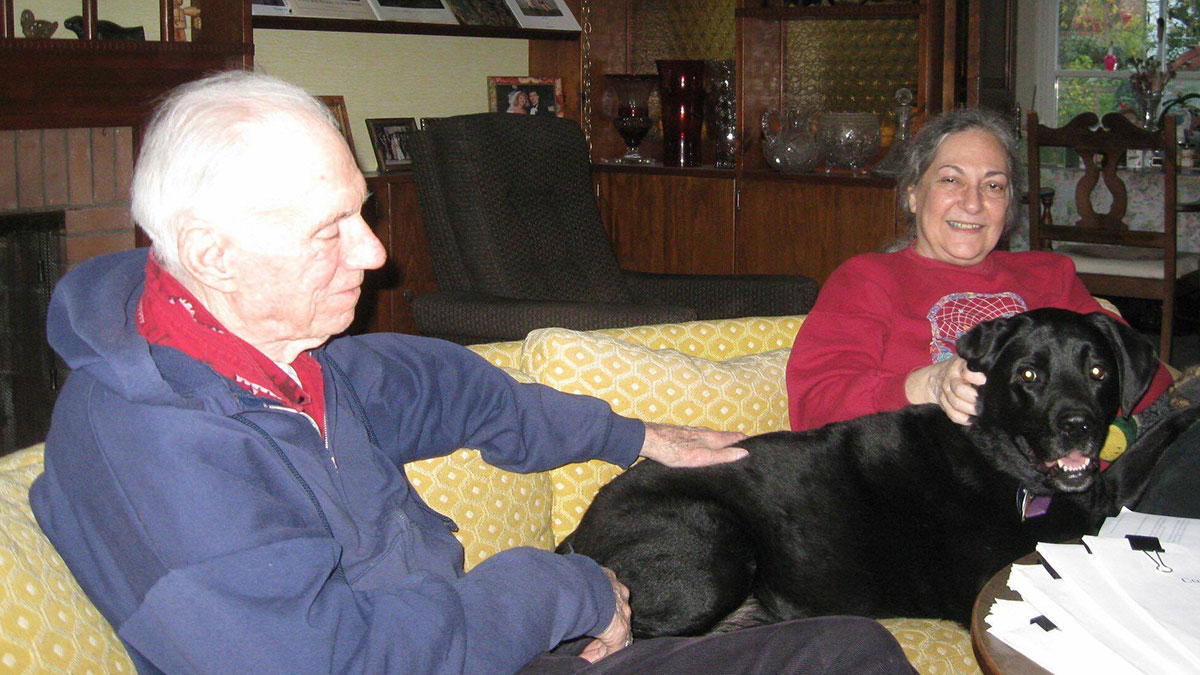Robert Jahn foi recentemente homenageado com o Prémio IAC de Contribuição Científica para a Ciência da Consciência – Lifetime Achievement, com sede em Portugal, ao lado de Brenda Dunne.
PortuguêsEnglish
Princeton, New Jersey (USA). Robert G. Jahn, Ph.D. faleceu ontem pela manhã, aos 87 anos. Dr. Jahn era um cientista do plasma galardoado, Professor de Ciência Aeroespacial, e antigo Dean de Engenhara na Princeton University. Jahn foi também o Fundador do Princeton Engineering Anomalies Research Lab (PEAR, 1979-2007) e do International Consciousness Research Laboratories (ICRL).
O Dr. Jahn recebeu o Curtis W. McGraw Research Award e um doutorado honorário em ciência pela Universidade de Andhra.
Robert Jahn foi recentemente homenageado com o Prémio IAC de Contribuição Científica para a Ciência da Consciência – Lifetime Achievement, com sede em Portugal, ao lado de Brenda Dunne. A cerimónia de entrega de prémios ocorreu no passado dia 20 de maio, durante o 2º Congresso Internacional de Consciência. O Prémio Científico do IAC honra pesquisadores que alcançaram importantes avanços teóricos ou empíricos na ciência da consciência. O Dr. Jahn também estimulou a criação de ciência da consciência aplicada ou empresas de tecnologia consciente como Psyleron, Entangled e I-ACT.
O Laboratório PEAR é amplamente considerado um dos programas mais significativos, inovadores e validados na história da ciência da consciência não dualista. Também foi um alvo de ridículo por cientistas que não aceitam a possibilidade de a mente afectar sistemas físicos sem o auxiliar de interfaces tecnológicas.
Em suas três décadas de colecta e análise de dados, a PEAR obteve grandes conjuntos de dados empíricos sobre interacções entre humanos e máquinas ou “anomalias de engenharia” que são contrárias a noções importantes da ciência convencional.
Um fã de música clássica e baseball, o Dr. Jahn faleceu hoje de manhã na sua casa Princeton, Nova Jersey, depois de uma doença séria prolongada, rodeado por seus entes queridos, confortável e em paz. Ele também é sobrevivido por todos aqueles que ele tem orientado e inspirado a permanecer curioso, de uma forma ética, rigorosa e implacável.
Jahn recebeu a Medalha de Stuhlinger para “Desempenho excepcional em propulsão eléctrica”. Em 2012, recebeu seu AIAA Wyld Propulsion Award por conquistas extraordinárias no desenvolvimento ou aplicação de sistemas de propulsão de foguetes.
Jahn foi membro do Instituto Americano de Aeronáutica e Astronáutica e foi presidente do seu Comité Técnico de Propulsão Eléctrica. Ele foi membro do Comité Consultivo de Ciência e Tecnologia espacial da NASA e membro do Conselho de Administração da Hercules Inc. de 1985 a 2001, onde actuou como Presidente do Comité de Tecnologia. Ele também actuou no Comité de Emergência, o Comité de Nomeação e o Comité de Responsabilidade Social. Ele renunciou ao conselho da Hercules Inc. em 2001 aos 70 anos.
Jahn foi o presidente da empresa Elwing que fabrica sistemas de propulsão para satélites.
PRINCETON, New Jersey (USA). Robert G. Jahn, Ph.D. has passed away this morning at the age of 87. Dr. Jahn was an award-winning American space propulsion researcher, Professor of Aerospace Science, and former Dean of Engineering at Princeton University. Jahn was also a founder of the Princeton Engineering Anomalies Research Lab (PEAR, 1979-2007).
Professor Jahn was a member of the American Society of Physics and the American Institute of Aeronautics and Astronautics and was president of the AIAA Electrical Propulsion Technical Committee, associate editor of the AIAA Journal and a member of the NASA Space Science and Technology Advisory Committee. He was vice president of the Society for Scientific Exploration and chairman of the board of International Consciousness Research Laboratories. He was a member of the Board of Directors of Hercules, Inc. and chair of its Technology Committee, and a member and chair of the Board of Trustees of the Associated Universities, Inc. He Received the Curtis W. McGraw Research Award from the American Society for Engineering Education and an Honoris Causa Doctor from Andrha University.
Robert Jahn was mostly recently honored with the Portugal-based IAC Award for Scientific Contribution to the Science of Consciousness – Lifetime Achievement, alongside Brenda Dunne. The awards ceremony took place last May 20, during the 2nd International Congress of Consciousness. The IAC Scientific Award honors researchers who have achieved significant theoretical or empirical advances in the science of consciousness. Dr. Jahn also went on to spur the creation of applied consciousness science or “conscious tech” companies like Psyleron, Entangled and I-ACT.
The PEAR Laboratory is widely considered one of the most significant, innovative and validated programs on the history of non-dualist consciousness science. It was also a target of ridicule by scientists who do not accept the possibility of the mind affecting physical systems without the aide of technological interfaces.
In its three decades of data collection and analysis, PEAR has obtained large sets of empirical data on interactions between humans and machines or “engineering anomalies” that run counter to important notions of conventional science.
The laboratory produced one of the largest datasets on consciousness ever. The results that call into question widely accepted scientific assumptions are of very high statistical significance and power. They are also (statistically) replicable and have in fact been replicated independently.
Having addressed all the main criticisms generally directed to the search for “parapsychological” phenomena, Robert Jahn and Brenda Dunne soon discovered that constructive criticism made the research more rigorous, but skeptics were not satisfied and few replication studies have been endeavored.
Robert Jahn and Brenda Dunne have, for three decades, mentored a new generation of consciousness researchers, educators, and social entrepreneurs through PEAR lab internships and their educational work with the Society for Scientific Exploration.
Books and Publications
Together, they published several books and hundreds of articles. The journal Fundamentals of Physics declared their first book Margins of Reality “a watershed book… a penetrating effort of erudition and insight”. After the decision to close the PEAR laboratory 10 years ago, their work continues through the International Consciousness Research Labs (ICRL), which includes the ICRL Press. The work of the duo began modestly as an attempt to replicate a study by a Princeton student who suggested that the mind could have an effect on a random number generator. Jahn’s initial goal was to determine what the student missed, as the result seemed unlikely. After all, Robert Jahn was an experienced scholar without tolerance for absurdities. The plasma physicist, aerospace engineer and Dean of the engineering college at Princeton University replicated the results, to his surprise. His last manuscript, co-authored with Brenda Dunne, will be published in 2018 as part of an anthology (Being and Biology, ICRL Press).
Studies and Investigations
In the late 1970s, Bob Jahn noted how particular aerospace technology became increasingly sensitive that needed to be shielded from passing cosmic rays. Thus, he obtained support from Douglas, a leader of the aerospace industry and other donors, Jahn set to explore the phenomenon. Although small, the effect could eventually worsen as operators worked with ever more miniaturized and delicate machines – perhaps as in cases of unexplained military breakdowns with stressed pilots (Gremlin cases).
Soon, Brenda Dunne joined the project. Before Princeton, she conducted remote perception research. Together, they risked their reputation and careers, facing even more ridicule and rancor than they ever expected. The editor of a prominent scientific journal once told the lab’s founder and senior scientist, Robert Jahn, that he might consider publishing Jahn’s recent article, if the author succeeded in transmitting it telepathically. Despite all this, they remained intellectually honest and scientifically rigorous and quite impartial. The fact that the program persevered for 3 decades, despite limited funding in this area and multiple unsuccessful attempts by the university to close the lab is in itself a remarkable achievement.
In 2007, the PEAR Laboratory decided that it was not likely that more data would change the rooted, scientific or theological opinions, because resistance was beyond reason and logic. They founded the International Consciousness Research Laboratories (ICRL) to operate beyond the university. Jahn and Dunne also spent years guiding the next generation of scholars and engineers of consciousness. They understand that mindsets change because new generations arise that have not been so indoctrinated, and that are willing to think outside the box. They also laid the groundwork for applications and discoveries for new technologies and startups.
The explanatory power of these discoveries has been explored in other fields, such as biology. The PEAR Lab has pointed out for decades that our own bodies are perhaps the most complex and sensitive of information processing machines. This raises the question: is it possible that some of the processes that occur in the body – for example, random fluctuations in functions such as heart beats, immune response, neuronal connections, genetic mutations and the like – may be susceptible to or, in fact, driven by consciousness?
Influencing the behavior of equipment. Is it possible?
Work in the Princeton Engineering Abnormalities Research Laboratory (PEAR) has consistently shown that “normal” volunteers – not people who claim to have “psychic powers” – can actually influence the behavior of microelectronic and other devices with their mental and emotional states (with their consciousness) without any conventional way of influencing them. Almost a hundred volunteers performed 212 million random number generator tests. The survey shows a tiny but statistically significant result that is not attributable to chance. Two-thirds of the volunteers were able to affect devices in the desired direction (with the intention of producing higher or lower numbers), while only half of them should have produced those results at random. Some of them obtained results that, when expressed in a graph, are so distinct that PEAR scientists could recognize the “signature” pattern of volunteers.
The PEAR laboratory discovered gender effects, larger effects for groups of operators with significant relationship or rapport. The results were less sensitive to parameters such as distance between operator and machine, time of the experiment (1 day before, 1 day after or at the same time as the formulation of the intention), or even the type of device – provided it was truly random or nondeterministic. The PEAR Laboratory has also developed new experimental projects and methods of analysis for remote perception experiments with aspects of remote viewing and telepathy. The size of the aggregate effect of the research program was surprising, especially when you consider how little evidence exists for many important claims in various “conventional” fields. Even the legendary science educator and skeptic of psi phenomena Carl Sagan noticed. The PEAR research program was one of the few studies he found difficult to ignore and he admitted it deserved further research.
Skeptics examined the lab instruments, data processing software, and protocols. Environmental influences, unrelated to consciousness, such as differences in temperature, passing traffic, earthquakes, and vibrations from a nearby machine shop, were discarded as the cause of the anomalies. Other scientists, in general, have been able to replicate the experiences of PEAR.
A fan of classical music and baseball, Dr Jahn passed away at home after a protracted serious illness, surrounded by his loved ones, comfortable and at peace. He is also survived by all those he has mentored and inspired to stay curious, in an ethical, rigorous and courageous way.




